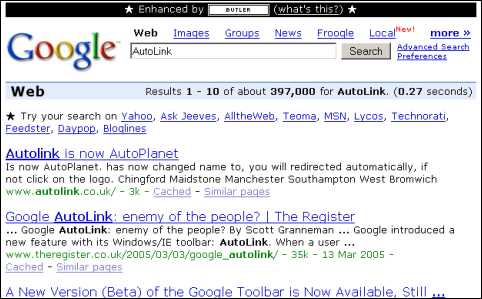Tuesday, March 15, 2005
Pilgrim’s Google Butler

Mark Pilgrim releases Butler, a Firefox browser add-on which needs Greasemonkey (once you installed Greasemonkey, simply restart Firefox, right-click the JavaScript provided by Mark, and click OK). Butler is released for free under the GPL license
What does Butler do? It links to competitors from the Google search result, removes ads on most Google pages (including Google Answers), fixes fonts, and adds links to other movie, product or weather sites. In Google Print, it removes image copying restrictions and adds links to other book sites. Future versions are planned to also remove ads in Gmail, as the Butler source code reveals in its comments.
Sounds like an aggressive software? Certainly, but it’s not Spyware, as Mark points out:
“It does not track the pages you visit, display ads, hijack Amazon affiliate links, log keystrokes, steal passwords, set cookies, “phone home,” or install any bundled software on your computer. It is simply a Firefox script that modifies a few Google services in ways that I find useful. If you don’t like it, you can easily uninstall it.”
The Google Terms of Service, on the other hand, state:
“You may not take the results from a Google search and reformat and display them”
If I’m not mistaken, this software is more of a political statement against Google’s AutoLink feature than anything else. The AutoLink feature, introduced by the Google Toolbar 3, changes other site’s content as well. Some accused it of repeating the Smart Tags disaster Microsoft got into a while ago. Others pointed out the AutoLink feature is not enabled by default, but has to be activated (clicked on) for every single page. It has been defended by pro-AutoLinkers by using a butler analogy – your butler may sort your mail for you, or underline certain passages in a newspaper.
Now the catch-22 in Mark’s approach is obvious: would Google complain about his Butler add-on, they’d be offering arguments that could be used against their Toolbar, effectively hurting their own product. And if they don’t react, they’re allowing Mark to set an example of what’s possible and legal to do in terms of changing Google’s content, opening up a door for others to follow. Just imagine Microsoft would be implementing such Google ad removal as default behavior for Internet Explorer 7 – they’d be depriving their competitor of nearly all of their revenues. The AutoLink discussion continues.
[Via Boing Boing.]
>> More posts
Advertisement
This site unofficially covers Google™ and more with some rights reserved. Join our forum!
